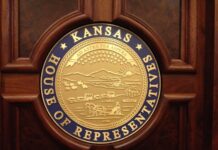A judge on Wednesday tried sorting out whether Secretary of State Scott Schwab ordered counties not to implement a law allowing voters to cast ballots anywhere in the county where they reside.
Shawnee County District Judge Thomas Luedke struggled to find evidence that showed Schwab violated the law by directly telling county officials not to implement the so-called vote anywhere statute that the Legislature passed in 2019.
Luedke said Schwab would be within the law to suggest that counties should not implement the vote anywhere statute.
He said advising counties about what they should do would be very different from outright prohibiting them from implementing the law.
“Counseling them that this may be difficult to implement, or discouraging them or something like that is different from coming out and saying, ‘No, we’re not going to do this,'” Luedke said.
“If there is a letter…the secretary of state basically sent out to all of the county election officers that says, ‘Hey, I don’t want you implementing anything to do with this law,’ now that would be some evidence,” he said.
Luedke took the case under advisement and is expected to rule soon.
The Democratic National Committee along with the Democratic Senatorial Campaign Committee, the Democratic Congressional Campaign Committee and the Kansas Democratic Party have sued Schwab to force implementation of the law.
Under the law, voting centers would replace customary polling places throughout a community, allowing voters to cast a ballot there instead of going to a designated precinct location.
During a hearing Wednesday, the plaintiffs asked Luedke to declare that counties can implement the law if they are able.
They were hoping to get a decision before the Aug. 4 primary although the lawyer for the state said it would be impossible to start the new voting procedure by then.
The state is seeking to have the lawsuit dismissed.
The lawyer for the Democrats, Hal Brewster, said that Schwab sent a letter to every county election official telling them they could not adopt the new law until new rules and regulations were put in place.
Brewster also pointed out that the secretary of state’s legal filings acknowledged that Schwab had been counseling counties against adopting the vote anywhere law until after the 2020 general election.
Brewster said Schwab reiterated the same point in media interviews.
Luedke didn’t seem persuaded, saying he was looking for direct evidence that Schwab told election officials not to implement the law.
“How has he counseled against?” Luedke asked. “Did he call on the telephone and say, ‘This may be a problem, we might not be able to do it’? Or has he sent something out to the counties saying, ‘Don’t do this’?”
The letter sent out by the secretary of state to election officials in April 2019, for instance, asked county election officials for time to adopt rules and regulations before implementing the law.
The letter said that setting a timeline for implementing the law would be premature.
The letter said “thoughtful time and preparation” were essential to implementing the law and it was a process that would not be rushed.
The lawyer for the state, Assistant Attorney General Arthur Chalmers, said that evidence doesn’t show that the secretary of state tried to block the law.
“All he’s done is said, ‘Please don’t do it, I don’t think it’s a good idea, I caution you against it,'” Chalmers said.
Brewster said the secretary of state has taken two different positions in his pleadings.
“He has said very diametrically opposed things in his papers,” Brewster said.
“He’s saying on one hand, (counties) have unlimited discretion and on the other hand, that they absolutely should not do this without his go-ahead.
“Up until the filing of this lawsuit, the secretary made very clear he was against this law going into effect ahead of the 2020 election,” Brewster said. “It’s very unclear where he stands.”
Another lawyer for the Democrats, Pedro Irigonegaray, said the judge should closely look at the secretary’s words in deciding whether Schwab was trying to stop the law from being implemented.
He said the secretary used language that encouraged election officials not to adopt the law rather than implement it.
“I believe that in doing so, it is a discouraging set of words to amplify the right to vote,” Irigonegaray said.
Brewster noted that the election officers in the four biggest counties — Johnson, Sedgwick, Wyandotte and Shawnee — work for the secretary of state.
Advising election officers in those counties against implementing the law effectively ties their hands because they answer to the secretary, Brewster said.
“It is a matter of law that these people work directly for him and the boss is saying” not to implement the new voting procedure, Brewster said.
Luedke continued to press for more evidence that Schwab directly tried to stop the law from being implemented.
He said the secretary has the latitude to advise the counties but can’t tell them not to implement the law.
“He can certainly say, ‘Hey, this is a complicated issue. I’m not going to be ready to have any sort of regulations or rules to guide you on this by the 2020 election. You’re free, if you can do it, to do it yourself.’
“Is there any evidence out there where the secretary categorically said to election officials, ‘Hey, you work for me, and I don’t want this thing going into effect and so don’t put it into effect’? If that evidence were out there, that seems to be a problem.”
















